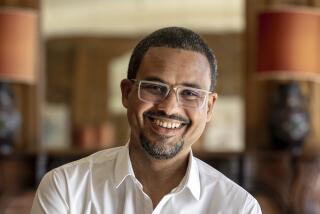Hegemony of Language : In French, Ignorance Is Not Bliss
- Share via
PARIS — Jean Dutourd, a 65-year-old novelist and one of the 40 members of the French Academy, was asked recently to describe his feelings about errors in French grammar.
“To my eyes,” he replied, “an error in French grammar is an immeasurably more serious crime than robbery, murder or even genocide, and I try not to make any.”
This man of letters, known for his dry humor, may have been exaggerating to make a point, but his words reflected a special French attitude toward language. Frenchmen revere their language and regard mastery of it as the hallmark of a civilized person.
Detractors, Beware
“No foreigner should ever mock the French language,” British historian Theodore Zeldin has written, “first, because he does not understand it properly, and secondly, because it has divine status in France.”
Sometimes, in fact, it seems that the French do not care about anything else. An exasperated U.S. Peace Corps volunteer, teaching several years ago in a French-run school in Cameroon, a former French African colony, pointed to his French colleagues and said, “They don’t care if an African student cannot add or subtract--so long as he cannot add or subtract in good French.”
An American in France is struck by the way that people in public life have mastered the language. Unlike their U.S. counterparts, French politicians and civil servants speak in complete sentences, using correct verb forms. They are not guilty of mispronunciations, malapropisms or mistakes in grammar.
Literate Presidents
Politicians turn out to be literary stylists, as well. In a recent study of books by politicians, the popular literary magazine Lire rated two presidents of the Fifth Republic, Francois Mitterrand, the incumbent, and the late Charles de Gaulle as writers with “remarkable style,” the magazine’s highest ranking.
Mitterrand, the magazine said, “would like to have written ‘The Brothers Karamazov.’ ”
French friends shake their heads in disbelief when an American tells them that the transcripts of presidential news conferences in Washington brim with grammatical errors and incomplete sentences, and that President Dwight D. Eisenhower left sentences in midair so often that he was sometimes incomprehensible.
In Washington, English grammar is so far down on virtually everyone’s list of priorities that politicians would probably think a journalist had gone slightly mad if he or she asked whether grammatical errors upset them. But a French news magazine asked two leading French politicians last year if they were “startled when someone commits a fault of French.”
“Yes,” replied Simone Veil, a conservative former minister, “but I am also startled by those I make.”
Lionel Jospin, administrative chief of the governing Socialist Party, said, “I almost always notice them.”
There are rare French politicians who do fumble with the language at times, but that failing makes them stand out. Some French anti-Communists confess that they always listen to the speeches of the Communist Party general secretary, Georges Marchais, in order to laugh at his mistakes in grammar.
Tyranny Strikes Early
Drilling in the language starts early, and French schoolchildren must submit to the dictee, French for “dictation,” in the first grade, as soon as they learn to read and write. The teacher reads a paragraph or two in French every day, and the children try to write down exactly what they hear.
This exercise, which emphasizes comprehension, grammar and spelling, occupies a central role for the rest of the child’s school years. The French school dictee is graded rather harshly: The maximum score is 20 points, and some teachers deduct five points for each grammatical error and two points for each spelling error. Failing is easy.
It can be heart-rending for an American to hear a first grader, in announcing his resolutions for the new year, pledge first of all to do better on the dictee. But French educators would be pleased.
The school system’s constant focus on linguistic mastery probably explains why many Frenchmen have difficulty understanding foreigners speaking accented and ungrammatical French. Nothing has prepared people here to make allowances for improper use of their language.
In the same way, the obsession with mastering the French language may explain why many French--who study English for years--refuse to speak it out of fear of embarrassing themselves.
Basis of Logic
The French obsession with their language has defenders and detractors. For centuries, the French have been told that the French language, when used correctly, has a clarity and logic that helps them analyze and order the world around them in a rational way. No other language, in this view, serves this purpose so well.
“Whatever is not clear is not French,” Antoine de Rivarol wrote in a 1783 essay on the universality of the French language, and his dictum has been taught to French students ever since.
“It is impossible,” a 19th-Century philosopher and politician, Jules Simon, said, “to be unreasonable or equivocal when one speaks French.”
The writer Anatole France, who won the Nobel Literature Prize in 1921, declared: “French has three qualities. The first is clarity, the second is again clarity and the third is still clarity.”
On the other hand, critics say that the French are so enamored of their language that they would rather talk than act.
“Faith in the power of language,” Sanche de Gramont has written, “commits the writer to the fallacy that words are deeds. An accusation is already a verdict, a call to arms a victory, and an appeal to popular behavior an improvement in popular virtue.”
Gramont, born into a titled French family, has made his career as a writer in the English language and has changed his name to Ted Morgan.
Loftiness Imposed
The exalted standing of the language in France may stem from the historical fact that French was imposed on the rest of the country by kings in Paris in the Middle Ages. For centuries thereafter, the rulers continued to look on the language as a unifying and nationalist force. This role for French was solidified in 1635, when Louis XIII founded the French Academy.
The prestigious academy still meets regularly. It continually revises the official dictionary (the ninth edition should be completed by the middle of the 21st Century) and issues warnings every three weeks about the improper use of French.
In their June bulletin, the academy’s 40 members, each of whom is elected for life, listed 33 errors they had spotted creeping into the language. These included the substitution of English words for French words, mispronunciation, poor understanding of the meanings of certain words, incorrect grammatical construction and the unnecessary creation of new words.
As a result, unlike lexicographers in the United States, who often try to make their dictionaries catch up with the way that the English language is commonly written and spoken, the academy members are constantly pressuring educated Frenchmen to conform in their writing and speaking to the way the language is set down in the official dictionary.
Although the French language looks impressively powerful and secure to an outsider, many educated people here do not seem to consider this so. They fret about threats to the language.
In an attitude that surprises American parents in France, who shake their heads at the rigor of the French school system, many French critics believe that the French educational system has gone soft--taking time away from language drills for what they regard as frivolous activities such as touring art museums.
Despite all the focus on language, government reports estimate that France has 300,000 to 400,000 functionally illiterate adults, and many Frenchmen blame this on the school system.
Back to Basics
Jean-Pierre Chevenement, the Socialist minister of education, agrees with many of the critics and has revised the curriculum of the elementary schools starting next month to ensure more time for French drills, cutting out more marginal activities.
French, like other languages, is threatened by the avalanche of television and movies in modern society. Schoolchildren would rather watch “Chateauvallon,” a French imitation of “Dallas,” than read Emile Zola. As a result, educators believe, children are failing to develop reading, writing and speaking skills properly.
French educators, however, react to this in a way that reveals a lot about the obsession with language. An American teacher, faced with the same competition from television, might broaden the reading list to include more exciting books in an effort to encourage pupils to read more. French teachers deal with the crisis by increasing the time spent on grammar drills.
In a recent study for the government, Antoine Prost, a professor of history at the University of Paris, reported that as a result of the increased emphasis on grammar, the study of French literature has been suffering in secondary schools.
Another threat to the language is posed by the argot of the young. For example, young people are given to using “verlan” or reverse language, which involves switching the syllables of words. Instead of saying branche, which means “plugged-in,” they turn the word around and say chebran. The problem is compounded, in the eyes of defenders of the language, because advertisers and movie producers try to keep up with the fad by repeating these twisted words.
Purists agree that the most potent threat to the French language comes from English. Defenders believe they must fight on two fronts.
The first is technical. New high technology, like computers, often comes from the United States, and much of the vocabulary used is American. Even French software uses basic computer language.
The second threat stems from the fact that it has become chic in France to mimic American ways and use American expressions. The French newspaper Liberation--favored by young, trendy, educated Parisians--likes to pepper its headlines with English expressions. When Mikhail S. Gorbachev was named the new Soviet leader early this year, Liberation’s main headline read, “Kremlin New Look.”
Proliferation of Commissions
Over many years, the French government has developed an enormous array of institutions to defend and promote the French language. Besides the academy, there is the High Council of Francophonie, the General Commission of the French Language, the Consultative Committee of the French Language, the Alliance Francaise, the Agency of Cultural and Technical Cooperation, the International Council of the French Language, the Institute of Research on the Future of French and many others.
The newspaper Le Monde has estimated that there are 250 government and private organizations devoted to the French language. A large percentage of foreign aid is spent on the teaching of the French language and on supporting international organizations that promote it.
The General Commission of the French Language, which operates out of the office of the premier, has the authority to fine companies that use foreign words in their advertising and labeling and fail to provide an adequate French translation. Two companies were fined recently for promoting products called Lemtea and Fast Drink.
These penalties are light, but officials believe that they call attention to the problem. “The French must become aware,” Christine Auxerre, an official of the commission, said, “that they are being eaten up by American vocabulary.”
Some Socialist members of Parliament believe that more must be done, and they have introduced legislation that would increase the defenses against English by closing some of the loopholes in the law. These lawmakers, according to the preamble to the legislation, are fed up with advertising that encourages young people to wear “shrink-to-fit jeans” on “le weekend.”
Yet, for an American living in France, these cries of alarm seem somehow misplaced. The most remarkable aspect of the French and their language is not the number of Americanisms that creep in, but the sheer pleasure and pride the French show in mastering their own language. It hardly seems to need defending.
More to Read
Sign up for our Book Club newsletter
Get the latest news, events and more from the Los Angeles Times Book Club, and help us get L.A. reading and talking.
You may occasionally receive promotional content from the Los Angeles Times.










